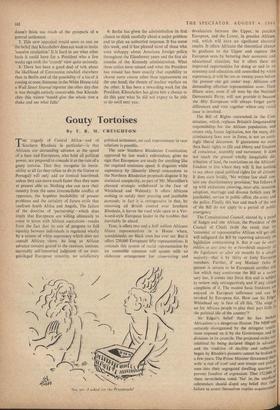Gouty Tortoises
By T. R. M. CREIGHTON rr HE tragedy of Central Africa—and of 1 Southern Rhodesia in particular—is that Africans are demanding advance at the speed of a hare and Europeans, who hold all political power, are prepared to concede it at the rate of a gouty tortoise. That they recognise its inevit- ability at all (as they refuse to do in the Union or Portugal) will only add an ironical heartbreak unless they can move much faster than they seem at present able to. Nothing else can save their country from the same irreconcilable conflict of opposites, the hopeless insolubility of present problems and the certainty of future strife that confront South Africa and Angola. The failure of the doctrine of 'partnership'—which does imply that Europeans are willing ultimately to come to terms with African aspirations—results from the fact that its rate of progress to full equality between individuals is regulated wholly by a system of white supremacy which does not consult African views. As long as African advance remains geared to the cautious, anxious, inevitably self-interested judgment of an over- privileged European minority, no satisfactory political settlement, no real improvement in race relations is possible. The new Southern Rhodesian Constitution, approved by last week's referendum, gives no sign that Europeans are ready for anything like the required minimum speed. It disguises white supremacy by illusorily liberal concessions as the Northern Rhodesian proposals disguise it by statistical complexity, as part of Mr. Macmillan's planned strategic withdrawal in the face of Whitehead and Welensky. It offers Africans nothing to satisfy their pressing and justifiable demands; in fact it is retrogressive in that, by removing all British control over Southern Rhodesia, it leaves the road wide open to a Ver- woerd-style European leader in the troubles that inevitably lie ahead. True, it offers two and a half million Africans fifteen representatives in a House where, scandalously, no black man has ever sat. But it offers 220,000 Europeans fifty representatives. It conceals this system of racial representation by 'an ostensible common roll' system with an elaborate arrangement for cross-voting and 'No. no 1 asked fior Pentateuch!' devaluation between the Upper, in practice , European, and the Lower, in practice African, roll, which will have no significant electoral results. It offers Africans the theoretical chance to graduate to the Upper and capture the European seats by bettering their economic and educational situation; but it offers them no improved opportunities for doing so and in an economy and education still controlled.by white supremacy, it will be ten or twenty years before the process'. can get under. way. Africans are demanding effective representation now. Their fifteen seats, even if all wan by the National Democratic Party, will not provide it because the fifty Europeans will always forget party differences and vote together where any racial issue is involved: The Bill of Rights entrenched. in the Con- stitution, which. replaces Britain's long-standing responsibility, for the African population; and covers only, future legislation, not the many dis- criminatory laws now in force, is not an excit- ingly liberal document. It guarantees no more than basic rights to life and liberty and freedom of conscience, assembly and movement. It does not touch the present wholly inequitable dis- tribution of land, the restrictions on the Africans' freedom to live where they will It has nothing to say about equal political rights for all citizens, It does state boldly, 'No written. law shall con- tain any discriminatory provision,' but follows it up with exclusions covering, inter alia, taxation, adoption, marriage and divorce (which may be justifiable), service in public office, the army and the police. Finally this ban and much of the rest of the Bill do not apply in e period of public emergency. The Constitutional Council, elected by a panel of Judges and one African, the President of the Council of Chiefs (with the result that 110 'extremist' or representative African will get on)• will safeguard the Bill by reporting adversely on legislation contravening it. But it can be over- ridden at any time by a two-thirds majority of the legislature or after six months by a simple majority—that is by thirty or forty European members. Further, if any Minister (who at present is certain to be European) certifies arlY law which may contravene the Bill as a !tat's' sary law, it comes into force first and is subjeci to review only retrospectively and if any citizen complains of it. The modest basic freedoms are enjoyed on European sufferance and can bc revoked by European fiat. How can Sir Edg"I Whitehead say in face of all this, 'The stage l' set for African people to play their part fully in the political life of the country'? Sir Edgar's belief that. he has bt Ac'' Africanism is a dangerous illusion. The NOP ‘'.3` certainly disorganised by the stringent resin'' lions imposed on it by the Government and by divisions in its councils. The projected strike o'ns inhibited by being declared illegal in advance; and the tradition of docility and subjection begun by Rhodes's pioneers cannot be broken 01 a few years, The Prime Minister threatened the with 'a rod of iron' and sent troops and police' men into their segregated dwelling, quarters lu, prevent freedom of expression. That' of 152,000 1 them nevertheless... voted. „ referendum should dispel any belief that then, failure to assert themselves implies acquiescence'


































 Previous page
Previous page